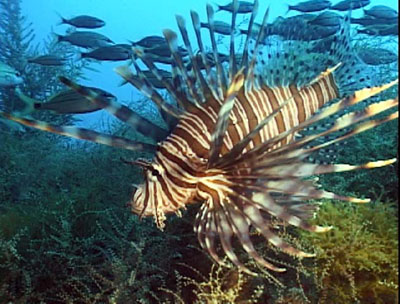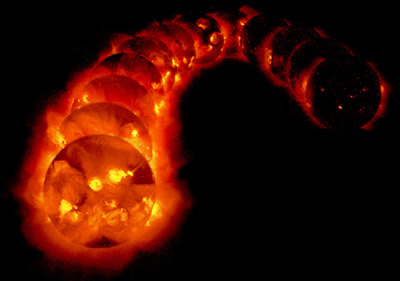Click on image for full size
Courtesy of NOAA
Atlantic Coral Reefs Are No Match for This Lion
News story originally written on July 29, 2008
Red lionfish live in the tropical Pacific and Indian Ocean. And many lionfish also live in people’s aquariums. Unfortunately, some lionfish have escaped their aquarium tanks and have made their way to the Atlantic Ocean. Now scientists say that these pretty fish appear to be on a deadly rampage. The lionfish could threaten coral reefs in the Atlantic.
The red lionfish is a voracious and skilled predator. Growing over a foot in length, it can appear to be a drifting clump of seaweed and herd smaller fish into small space before quickly gobbling them up. Atlantic fish have never seen such an energetic hunter.
To study the impact of the lionfish on coral reefs, zoologist Mark Hixon and graduate student Mark Albins traveled to a coral reef research station at Lee Stocking Island in the Bahamas. The researchers added lionfish to some small reefs while keeping the lionfish out of other small reefs. They identified the types of fish and their numbers in all the reefs before and after they released the lionfish.
The results were shocking-- almost four out of five young fish were eaten by the hungry lionfish in the reefs they inhabited. Most of the other fish eaten by lionfish were young adults, not yet fully mature.
The scientists fear that this level of destruction could become normal for many Atlantic reefs. They recommend that people take steps to decrease the number of lionfish before more fish invade the region.
Coral reefs are important to the health of oceans in many ways. They break waves, which helps prevent erosion of the shore during storms. Reefs are also a home for thousands of species of marine plants, fish, and invertebrates. Reefs are important to people because they are a source of food and new medicines. Reefs are a complex balance of species living together, so when a dangerous species like the red lionfish moves in it can cause drastic change to reefs.















